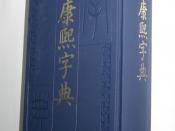Compassion: An Important Value
Emperor of China, is an incredible biography of the second emperor, K'ang-hsi (1661 - 1722), and his life as part of the last Chinese imperialistic dynasty, the Qing. Based on the writings of the emperor, court records and later secondary sources, the book follows the emperor through his struggles with opposition, Manchurian and Han nobility, his troubled relationships with his numerous sons, his old age, and his legacy. By reading K'ang-Hsi's own words as he writes of such topics as hunting, invention, the Jesuits, government, and the introduction of Western science, we learn about different aspects of his life including the different values, beliefs, and roles. One value that is consistently evident throughout the book, and is a large part of who he is and what the emperor stands for, is his desire to be compassionate, or as defined by Merriam Webster Dictionary, sympathetic consciousness of others' distress together with a desire to alleviate it.
This compassion is especially found in the second part of the book, entitled "Ruling," which explores the Emperor's world of action and common sense. The emperor's strong sense of compassion and ren, or humaneness, comes from his studies of Confucianism. (China 78) An example of this mercy and compassion especially, in his dealings with crime and the death penalty, is exemplified through this quote: " I have been merciful where possible. For the ruler must always check carefully before executions, and leave room for the hope that men will get better if they are given the time." (Emperor 31)
During imperial China, the supreme ruler, or "Son of Heaven", as he was known, played an integral part as the ruler of all the people in his kingdom, through the divine authority that he was thought to have, marking an...


